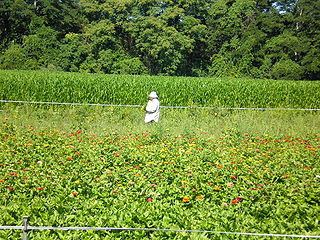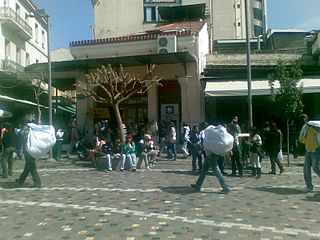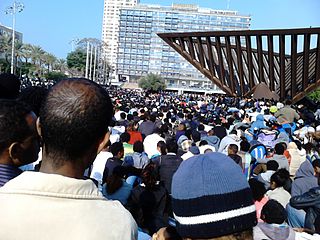Related Research Articles

Foreign workers or guest workers are people who work in a country other than one of which they are a citizen. Some foreign workers use a guest worker program in a country with more preferred job prospects than in their home country. Guest workers are often either sent or invited to work outside their home country or have acquired a job before leaving their home country, whereas migrant workers often leave their home country without a specific job in prospect.
Since 1945, immigration to the United Kingdom, controlled by British immigration law and to an extent by British nationality law, has been significant, in particular from the Republic of Ireland and from the former British Empire, especially India, Bangladesh, Pakistan, the Caribbean, South Africa, Nigeria, Ghana, Kenya, and Hong Kong. Since the accession of the UK to the European Communities in the 1970s and the creation of the EU in the early 1990s, immigrants relocated from member states of the European Union, exercising one of the European Union's Four Freedoms. In 2021, since Brexit came into effect, previous EU citizenship's right to newly move to and reside in the UK on a permanent basis does not apply anymore. A smaller number have come as asylum seekers seeking protection as refugees under the United Nations 1951 Refugee Convention.

A migrant worker is a person who migrates within a home country or outside it to pursue work. Migrant workers usually do not have an intention to stay permanently in the country or region in which they work.

Foreign nationals (aliens) can violate US immigration laws by entering the United States unlawfully or lawfully entering but then remaining after the expiration of their visas, parole, or temporary protected status. Illegal immigration has been a matter of intense debate in the United States since the 1980s.
Migrant domestic workers are, according to the International Labour Organization’s Convention No. 189 and the International Organization for Migration, any persons "moving to another country or region to better their material or social conditions and improve the prospect for themselves or their family," engaged in a work relationship performing "in or for a household or households." Domestic work itself can cover a "wide range of tasks and services that vary from country to country and that can be different depending on the age, gender, ethnic background and migration status of the workers concerned." These particular workers have been identified by some academics as situated within "the rapid growth of paid domestic labor, the feminization of transnational migration, and the development of new public spheres." Prominent discussions on the topic include the status of these workers, reasons behind the pursue in this labour, recruitment and employment practices in the field, and various measures being undertaken to change the conditions of domestic work among migrants.
Illegal immigration is the migration of people into a country in violation of that country's immigration laws, or the continuous residence in a country without the legal right to. Illegal immigration tends to be financially upward, from poorer to richer countries. Illegal residence in another country creates the risk of detention, deportation, and/or other sanctions.
Immigration to South Korea is low due to restrictive immigration policies resulting from strong opposition to immigrants from the general Korean public. However, in recent years with the loosening of the law, influx of immigrants into South Korea has been on the rise, with foreign residents accounting for 4.9% of the total population in 2019. Between 1990 and 2020, South Korea's migrant population has grown 3.896%, second highest level of growth in the world.
In December 1996 and January 1997, South Korea experienced the largest organized strike in its history, when workers in the automotive and shipbuilding industries refused to work in protest against a law which was to make firing employees easier for employers and curtail labor organizing rights.

Foreign domestic helpers in Hong Kong are domestic workers employed by Hongkongers, typically families. Comprising five percent of Hong Kong's population, about 98.5% of them are women. In 2019, there were 400,000 foreign domestic helpers in the territory. Required by law to live in their employer's residence, they perform household tasks such as cooking, serving, cleaning, dishwashing and child care.

Immigration to Greece percentage of foreign populations in Greece is 7.1% in proportion to the total population of the country. Moreover, between 9 and 11% of the registered Greek labor force of 4.4 million are foreigners. Migrants additionally make up 25% of wage and salary earners.
Korean Canadians are Canadian citizens of full or partial Korean ancestry, as well with immigrants from North and South Korea. As of 2016, Korean Canadians are the 8th largest group of Asian Canadians.

In South Korea, immigration policy is handled by the immigration services of the Ministry of Justice, Ministry of Labor, Ministry of Health and Welfare and the Ministry of Foreign Affairs and Trade. The Nationality Act, Immigration Control Act, Multicultural Families Support Act, and the Framework Act on Treatment of Foreigners are the foundations of immigration policy in Korea. The Korean government initiated a discussion in 2003 on establishing an independent immigration office to accommodate fast-growing immigrant and to prepare inclusive and rational immigration policies; however, there has been little progress. The Foreigner Policy Committee, headed by the Prime Minister, coordinates foreigner-related policies which were handled by many ministries. However, its role is limited because of a shortage of resources and manpower. The establishment of an Immigration Office is expected to solve these problems by concentrating all related resources and manpower under one umbrella.
Bahrain is a Source and destination country for men and women subjected to trafficking in persons, specifically forced labor and forced prostitution. Men and women from India, Pakistan, Nepal, Sri Lanka, Bangladesh, Indonesia, Thailand, the Philippines, Ethiopia, and Eritrea migrate voluntarily to Bahrain to work as domestic workers or as unskilled laborers in the construction and service industries. Some, however, face conditions of forced labor after arriving in Bahrain, through use of such practices as unlawful withholding of passports, restrictions on movement, contract substitution, non-payment of wages, threats, and physical or sexual abuse.

African immigration to Israel is the international movement to Israel from Africa of people that are not natives or do not possess Israeli citizenship in order to settle or reside there. This phenomenon began in the second half of the 2000s, when a large number of people from Africa entered Israel, mainly through the then-lightly fenced border between Israel and Egypt in the Sinai Peninsula. According to the data of the Israeli Interior Ministry, 26,635 people arrived illegally in this way by July 2010, and over 55,000 by January 2012. In an attempt to curb the influx, Israel constructed the Egypt–Israel barrier. Since its completion in December 2013, the barrier has almost completely stopped the immigration of Africans into Israel across the Sinai border.
Women migrant workers from developing countries engage in paid employment in countries where they are not citizens. While women have traditionally been considered companions to their husbands in the migratory process, most adult migrant women today are employed in their own right. In 2017, of the 168 million migrant workers, over 68 million were women. The increase in proportion of women migrant workers since the early twentieth century is often referred to as the "feminization of migration".
Migrant workers in the United Arab Emirates describe the foreign workers who have moved to the United Arab Emirates (UAE) for work. As a result of the proximity of the UAE to South Asia and a better economy and job opportunities, most of the migrant foreign workers are from India, Nepal, Sri Lanka, Bangladesh, and Pakistan.
Migrant workers in the Gulf Cooperation Council region involves the prevalence of migrant workers in the Kingdom of Bahrain, the State of Kuwait, the Sultanate of Oman, the State of Qatar, the Kingdom of Saudi Arabia and the United Arab Emirates (UAE). Together, these six countries form the Gulf Cooperation Council (GCC), established in 1981. The GCC cooperates on issues related to economy and politics, and the subject of migrant workers constitutes a substantial part of the council's collaboration. All of the GCC countries are dependent on migrant labor to bolster and stimulate economic growth and development, as the GCC countries possess an abundance of capital while the domestic labor capacity is low. Although migrant workers in the Persian Gulf region amount to no more than 10% of all migrants worldwide, they constitute a significant part of the populations of their host countries.
The Migrants' Trade Union (MTU) in Korea was established on May 3, 2005 by 91 workers in South Korea. It was established to address poor working conditions and wage theft, widespread inequality and discrimination at the workplace. MTU has focused on achieving legal rights and recognition for undocumented migrants in South Korea.
The 1995 Myeong-Dong Migrant Labor Protest occurred in front of the Myeong-Dong Catholic Church in Seoul, South Korea. The nine day sit-in protest by 14 Nepalese migrant workers, which started on New Year's Day and lasted until January 9, was a demonstration against the Industrial Trainee System and the inhumane working conditions that stem from this guest worker program. Several events that led up to the 1995 sit-in includes Jeon Tae-Il's death, as well as rising anti-foreign worker sentiment and activism from the Federation of Korean Trade Unions (FKTU) and the Korean Trade Unions Council (KTUC). The 1995 demonstration is notable for sparking the migrant labor rights movement, including the creation of the Migrant Worker Support Movement (MWSM) and the Joint Committee for Migrant Workers in Korea (JCMK).

The Hotline for Refugees and Migrants (Hotline) is a human rights organization that utilizes direct service provision, litigation, and advocacy to uphold the rights of refugees, migrant workers, and survivors of human trafficking in Israel. In Hebrew, the organization is known as המוקד לפליטים ולמהגרים (hamoked l'plitim v l'mehagrim).
References
- ↑ Kim, Wang-Bae (March 2004). "MIGRATION OF FOREIGN WORKERS INTO SOUTH KOREA: From Periphery to Semi-Periphery in the Global Labor Market". Asian Survey. 44 (2): 316–335. doi:10.1525/as.2004.44.2.316.
- ↑ Kim, Nora Hui-Jung (September 2008). "Korean Immigration Policy Changes and the Political Liberals' Dilemma". International Migration Review. 42 (3): 576–596. doi:10.1111/j.1747-7379.2008.00138.x. S2CID 145507308.
- ↑ Hayes, Sean (2021-06-22). "How to Appeal a Korean Deportation Order or Exit Order?". The Korean Law Blog by IPG Legal. Retrieved 2022-09-26.
- 1 2 Asian Migration Policy: South, Southeast and East Asia. Edited by Md. Mizanur Rahman and Akm Ahsan Ullah. ISBN 9781622570201
- 1 2 "American set to be deported from South Korea for pro-North views." Retrieved 11 May 2019.
- 1 2 "Six foreign workers deported, one arrested over terror allegations". The Korea Times . 17 July 2018. Retrieved 13 June 2019.
- 1 2 3 Legal Reform in South Korea. Edited by Tom Ginsburg. ISBN 9780415649698
- ↑ "Country Reports on Human Rights Practices for 2008: Volume 1" (PDF). United States Department of State. December 2010.
- ↑ "Korea: Migrants' trade union leaders deported". www.ituc-csi.org. Retrieved 13 June 2019.